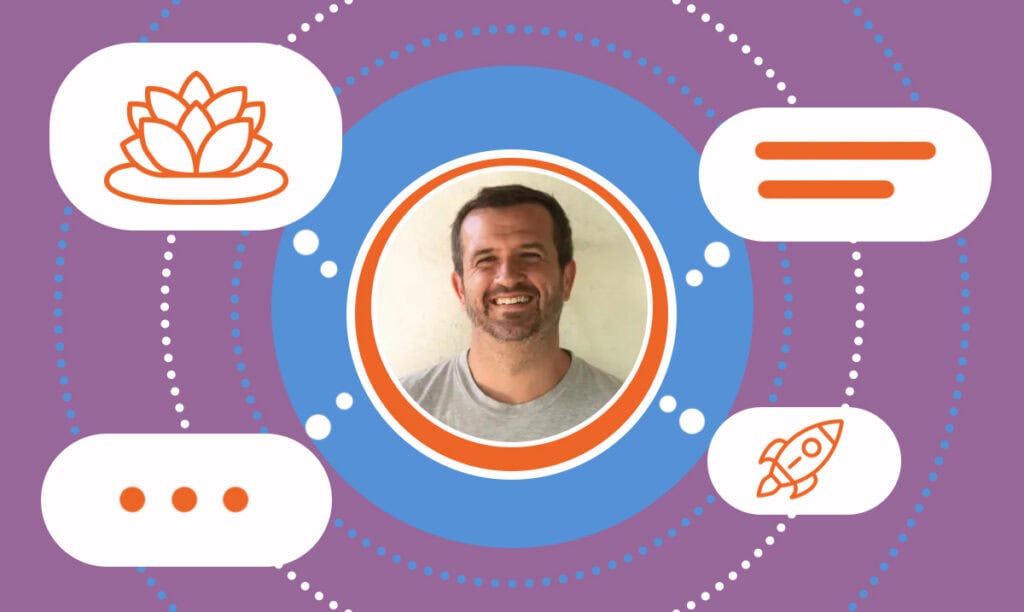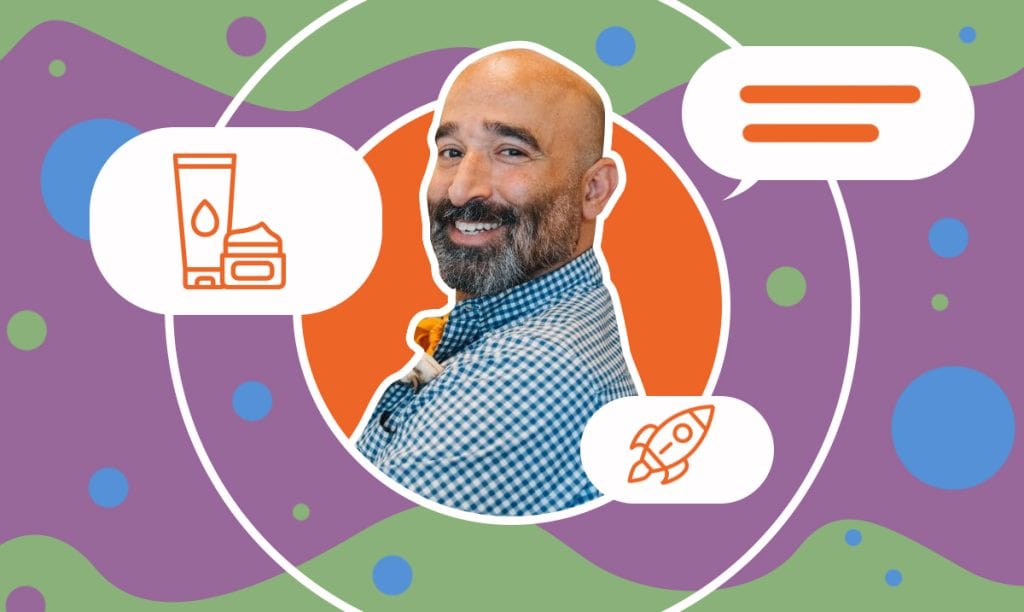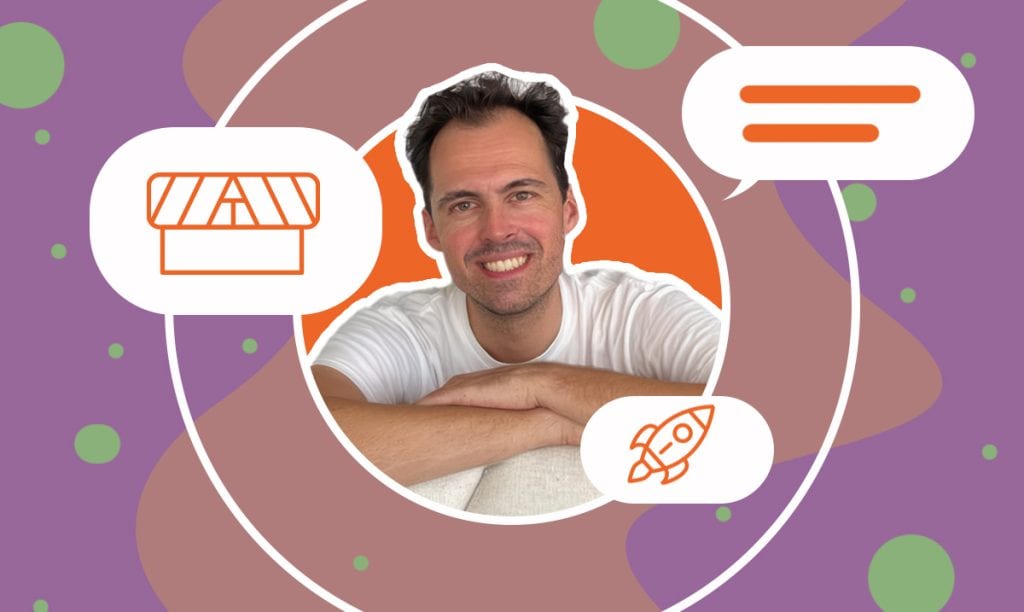Jonathan Plotzker-Kelly, founder of Heliotrope San Francisco, has spent over a decade crafting high-quality, all-natural skincare products rooted in ...
How SoCal Retreats Blend Science and Spirituality for Well-being
Written by: Esther Strauss
Esther is a business strategist with over 20 years of experience as an entrepreneur, executive, educator, and management advisor.
Published on May 21, 2024

John Quirk, a multi-faceted wellness expert, is the visionary behind SoCal Wellness Retreats, the Quirk Hypnobreathing Method, and Quirk Mindset Shift Coaching. With an extensive background as a yoga teacher, Reiki healer, and meditation instructor, John has dedicated his life to helping others master their most valuable asset — their mind. His journey from corporate life to founding a successful wellness business is both inspiring and enlightening, and this interview brings you insights into John’s path, the unique aspects of his retreats, and valuable advice for aspiring wellness entrepreneurs.
The Inspiration Behind SoCal Wellness Retreats
SBS – What inspired you to start SoCal Wellness Retreats?
John – I got fired from my last corporate job, so it was a pretty easy decision to have to do something new. In my corporate job, I was at the top of the mountain in many ways. I had gotten to where I wanted to go. If you looked at it on paper, I had built a pretty cool life. I had a really cool job and social networks, but I was very unfulfilled at work. I did not like going to work anymore, and I didn’t like working for somebody else, which was always a thing. I never really liked being told what to do. I was always a bit of punk rock and angst against authority.
When I stepped back from getting fired, I realized that I had to find more joy in what I was doing. I got this strong sense that life is so precious and short, and if we go to something every day and invest a lot of time and energy into it, we should feel joy doing it. In the West, in particular, we reverse-engineered the idea work. We think about what we can make money with first, and then we try to find joy within it second. The entrepreneurship journey is quite fun because it’s the opposite in many ways — people are taking something they really love and are really passionate about and then building it up to a point where they can sell or monetize it.
At the time, I was very stressed and overworked, and going to yoga was the only thing that brought me peace and joy. Because of that, I went into yoga teacher training. It felt very rewarding to learn a new skill for the first time since college and invest in getting good at something. Once I left the training, I wanted to share that with people, so I started teaching and had private clients. That spawned the idea of doing retreats because it’s very hard to make a living in the world of teaching yoga.
I thought about taking some of those people I’m connecting with and creating a business around it — taking them to a beautiful location, adding in some food, making it a full experience. When I decided that, I had to do more of the work. Figuring out the venue is one example. Normally, when you’re a yoga teacher, you could just show up and teach.
This has been so rewarding because it’s taken me all around the world. It helped me move to California, which had always been my dream place. I followed my joy and continued on that path, and, of course, at some point, you have to make money. But at first, it was just about getting back to that homeostasis of feeling good about what I was investing my energy into.
Overcoming Early Challenges
SBS – What challenges did you face in the first stages of your business?
John – It wasn’t easy at all. The biggest thing is logistics. We just brought 20 people to Bali and Indonesia, and we’ve got people traveling from all over the world. They all have varying levels of travel experience. They have anxiety about traveling that far, packing for that kind of trip, getting to the retreat from the airport, etc.
I very much love to show up and do the things I do — breathwork, meditation, yoga, and all these things — but then there’s all this other stuff that comes with it — the day-to-day of running a business. Then, on a higher level, you need to think about cash flow, marketing and advertising, and all the pieces that go into building and scaling even a successful business. Now, I am trying to figure that out. I’ve spent a lot of money on marketing and support staff. Frankly, a lot of it has not really affected my bottom line, so it’s been a lot of money spent without a lot of money being recuperated.
Those have been learning lessons of how to spend money, time, and energy the right way because, ultimately, you can’t do everything yourself. I’ve tried, though. I’ve tried to be my own social media manager, website manager, accountant, etc. Wearing all the hats at first seems exciting, but after a certain amount of time, you get a bit burnt out, and you need to be able to ask for help. How you ask for the right help is another challenge.
Unique Offerings
SBS – What makes you different from other people doing similar retreats, and what makes your retreats unique?
John – It’s a really good question, and many business coaches have asked me about it recently, so I’ve started to pay attention to it. Frankly, I didn’t worry about what other people were doing for a very long time. I focused on doing what I was doing the best way I could. There’s value in both. If you look at what other people are doing in the same space as you (I don’t even like to think of it as competition), you could get inspired and see things you don’t want to do.
We’ve always wanted to create a welcoming and accommodating environment for people. Even price-wise, we’ve wanted to make sure it’s accessible. For me, the best compass is just staying in touch with myself and the people I’m connected with in our community, listening to them, and hearing what they want. A lot of times, in the retreat space or even in the entrepreneur spaces, I see many people think about what they want to sell to others or what experience they want to build for them. If we spend more time in the seat of our prospective clients and consumers, however you want to look at it, we’ll see the things they’re challenged by and the issues they’re dealing with. I have a very adept understanding of what can help people the most and how I can make a big impact on people through a lens of support and service rather than selling them something. That’s always been my superpower.
Now, I’m getting a lot of feedback. There are many retreats out there, and the retreat business is booming and growing. Still, people are even more hesitant to come to my retreats because they’ve seen what has happened to other people who went to retreats that promised all these things, and then the experience wasn’t nearly as good as promised. Many people are wrongfully selling retreats because they want to make a quick buck, and they’re not thinking about all the time and all that logistical stuff they need to invest and take care of.
There’s always a tendency to copycat. When something’s working, other people want to pick up on that success — and that’s totally fine — but ultimately, if you lead with the passion part first, you can find a way to monetize it later. Again, this is prevalent in the West. People just think about making money doing something rather than being passionate about something and providing something of quality.
Evolving Marketing Strategies
SBS – How much has your marketing strategy changed, and what do you do now to attract new clients?
John – It’s funny — the more I’ve thought about marketing strategy, the less well things have gone. I know that sounds crazy, but it’s true. When I started this, I was just following joy. I wanted to create more joy and great experiences for people. I thought about money, for sure, but it wasn’t my number one concern. When I focus on being the best at being me, making sure that I’m taking care of myself, helping and supporting people through the retreats, and bringing them joy, that’s when things flow the best. The more I think about marketing strategies, business infrastructure, and similar stuff, the more my business stagnates.
I’m a teacher of quantum mechanics. I believe in the laws of attraction. I believe in energy and how it interacts with matter and changes it. If you think about yourself as a big ball of energy, you need to keep yourself in a very high vibration because then you’ll attract good things and situations. Honestly, when my business has been at its best, I haven’t really been working that hard at it. I haven’t been stressing over it or sitting at the computer for hours and hours on end. It was more about just staying in a flow of abundance and feeling good about things on a day-to-day basis. It’s an important reminder.
Yes, we have to protect ourselves with money, create good contracts and agreements, and ask for help when we need it. But, ultimately, if we feel good about what we’re doing on a daily basis, that will really be the best guiding compass.
Building a Strong Team
SBS – What qualifications or qualities do you look for when hiring someone to join your team?
John – I’ve never actually done job applications or anything like that. It’s always been more through word of mouth. People who come into my world or on retreats reach out to me saying they know someone who would be a great fit for this. For me, hiring has been more energetic and more of “a feeling” sort of thing.
I’m now working with a team of different people who do different things. One is a social media manager who also does graphics. Then, there’s my business coach, who’s coaching me on building a coaching program. I also have a web editor and other staff, and I’ve connected with most of them through synchronicities and synergies.
Intricacies of Teaching
SBS – Do you hire different people to teach different things on your retreats?
John – No, I teach everything (meditation, breathwork, yoga, quantum mechanics, neuroscience, etc.). Many people reach out to me, and I would like to open things up to collaborate with others, but whenever I’ve done that in the past, it hasn’t worked too well. I’m very particular about the way that I structure things. It’s a delicate balance to do the amount of education we’re doing, but it also creates spaciousness for people healing and going through things. You can take on other people’s stuff very easily, like when people are carrying heavy energy and heavy trauma. You can absorb that as a facilitator if you can’t build that boundary to protect yourself.
Measuring Success
SBS – How do you measure the success of a retreat?
John – Every retreat is a success because we always get to take people away from their day-to-day lives. I always say that people who come to us will get a biological upgrade because they’re going to breathe, meditate, move their bodies, get sunshine, eat well, and be off their phones.
I’ve never had a bad group. My clients are always special and very dear to my heart, but there are varying degrees of excellence. Some groups will stand out from others. Usually, it’s because of how they come together and bond. It’s the synergy. You can’t put a measure on how that’s going to go until you see it in action. Once a retreat is over, you know you’ve been a part of something special. I put pictures of some of my favorite groups on my wall to remember them.
Impact of Customer Feedback
SBS – How much has customer feedback affected your approach?
John – That’s a great question because I’m going through that now. I’ve been planning many new types of retreats, like going to new places and doing new things. We just planned one for Sedona in Arizona. It was a six-day, five-night retreat. Sedona is very expensive, so the retreat had to be pretty pricey. We put it out to our community, and a lot of people were interested. However, a few of them reached out to me (which is something I’m really proud of and really happy and grateful for) saying it looked great, but it was too expensive. One lady in particular, who’s been on two of my retreats (Southern California and Bali), said she would love to attend this retreat, but, as a nurse, she isn’t paid that well to be able to afford it. She thought I might have been looking for new clientele with this retreat. That got me thinking.
Lately, I’ve been focused on all the potential of how much money I can make and how much I can grow the business financially, and I’ve lost track of the essence. So, I went through all of our intake forms, read many of our reviews, and listened to many of the testimonials that people have given us, either on Google or video. That was what I wanted to be the guiding light for what I do in creating a new year of retreats.
I’ve read and listened to many things about entrepreneurs and small businesses, and that scaling too much too quickly is one of the biggest pitfalls. Sometimes, they get too big for themselves, so they lose track of what has made them successful with their customer base. I just experienced that. I have these great ideas, but I need and want to stay cognizant of what best serves our community. My job is to be of service to people and help them. The money will come if I continue to focus on that, so that’s what I’m currently doing. That was always the goal for this.
This year has been a really good test of the levels we could go to. But honestly, I’ve never had the vision of growing a conglomerate business. I’ve always liked that we’re more intimately connected to the people in our community. I like the fact that we don’t just sell commodities in bulk— but these individual experiences. Coaching is an opportunity to connect one-on-one with people, get into their lives, and understand what makes them tick. Whether it’s before a retreat, after a retreat, or just coaching, I strive to find a way to make the biggest impact on people and be of the most service.
If you’re building a new product, improving on an existing one, or starting something from scratch, you’ll never go wrong by putting the client first. You’ll always be able to figure out pricing, marketing, etc. If you have something people need or a service that people want, you’ll always be okay.
Advice for Aspiring Entrepreneurs
SBS – What advice would you give someone who wants to start a similar business?
John – You need to take care of yourself and put the fun and enjoyment element first. Like I said, my businesses always thrived when I felt the best, not when I worked the hardest or sat on the computer the longest. When I energetically felt aligned with what I was doing and how it was going, all the opportunities and all the synchronicities would happen. However, when I tried to do it more analytically, thinking my way through it, everything slowed down. So, check if you’re energetically aligned with what you’re doing and make sure you’re making strides to build a business you’d want to be a part of, even if you were an employee and not the owner.
Tony Robbins also once said that you should always build your business. Run it so well that you can sell or give it to somebody else.
Subscribe to Our Newsletter
and gain insider access to cutting-edge business insights and trends.
Featured Resources

How a Retail Pro Turned Skin Sensitivity Into a Skincare Brand
Published on April 3, 2025
Read Now

How AirTulip Improves Sleep Quality and Eases Allergies with Clean Air
Published on February 27, 2025
Imagine waking up feeling truly refreshed, breathing air that is 1,000 times cleaner than what traditional purifiers can offer. That’s the promise ...
Read Now

How Lin Mezori Is Transforming the Recovery Industry
Published on January 2, 2025
Lin Mezori, the matriarch behind Pure Recovery, has transformed the wellness and recovery space with her vision of blending innovative therapies and ...
Read Now
Comments